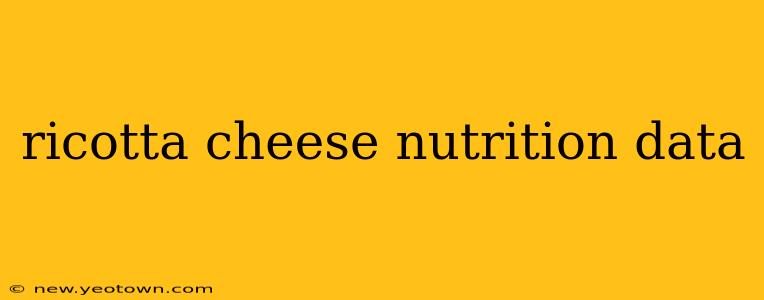Ricotta cheese, with its creamy texture and subtly sweet flavor, has long been a staple in Italian cuisine and beyond. But beyond its delicious taste, ricotta offers a surprising nutritional profile packed with benefits. Let's delve into the world of ricotta cheese nutrition, exploring its macronutrients, micronutrients, and potential health impacts. This isn't just about numbers; it's about understanding how this versatile cheese can be a valuable part of a balanced diet.
What are the Macronutrients in Ricotta Cheese?
Ricotta, unlike many other cheeses, is relatively low in fat compared to its counterparts like cheddar or parmesan. The exact macronutrient breakdown varies slightly depending on the type of milk used (whole milk, part-skim, etc.) and the manufacturing process. However, a general guideline for a 100g serving of part-skim ricotta reveals a fascinating story:
-
Protein: Ricotta is a fantastic source of protein, crucial for building and repairing tissues, supporting immune function, and keeping you feeling full and satisfied. You can expect roughly 12-14 grams of protein per 100g serving. This makes it an excellent choice for post-workout recovery or as part of a weight-management plan.
-
Fat: While containing fat, ricotta’s fat content is generally lower than many hard cheeses. A 100g serving of part-skim ricotta provides around 4-6 grams of fat, making it a more permissible option for those watching their fat intake. Whole milk ricotta will naturally be higher in fat.
-
Carbohydrates: Ricotta also contains a moderate amount of carbohydrates, predominantly in the form of lactose (milk sugar). This contributes to its creamy texture and slightly sweet taste. A 100g serving typically contains around 4-6 grams of carbohydrates.
What are the Micronutrients in Ricotta Cheese?
Beyond the macronutrients, ricotta offers a selection of essential micronutrients:
-
Calcium: Ricotta is a good source of calcium, vital for strong bones and teeth. This is particularly beneficial for growing children, adults maintaining bone health, and older individuals combating age-related bone loss.
-
Riboflavin (Vitamin B2): Riboflavin plays a key role in energy metabolism and maintaining healthy skin and eyes. Ricotta provides a decent amount of this important vitamin.
-
Phosphorus: Phosphorus works alongside calcium in maintaining healthy bones and teeth. It’s also involved in numerous other bodily functions.
-
Selenium: An important trace mineral, selenium acts as an antioxidant, protecting cells from damage.
Is Ricotta Cheese Good for Weight Loss?
Many people wonder if ricotta cheese fits into a weight-loss plan. The answer is nuanced. Its higher protein content helps you feel fuller for longer, potentially reducing overall calorie intake. The lower fat content in part-skim varieties makes it a more favorable option compared to higher-fat cheeses. However, portion control remains crucial, as even lower-fat options contain calories.
How Many Calories are in Ricotta Cheese?
The calorie count of ricotta varies depending on the fat content. A 100g serving of part-skim ricotta typically contains around 170-200 calories, while whole milk ricotta can have closer to 250 calories. Always check the nutritional information label on the specific product you're consuming.
What are the Benefits of Eating Ricotta Cheese?
The benefits of incorporating ricotta cheese into your diet extend beyond its nutritional profile. Its versatility allows it to be used in both sweet and savory dishes, adding flavor and texture. Its high protein content supports muscle building and satiety, while the calcium contributes to strong bones. The presence of various B vitamins supports overall energy levels and metabolic functions.
Is Ricotta Cheese Healthy?
Ricotta cheese, particularly the part-skim variety, can be a part of a healthy diet. Its nutritional profile makes it a valuable source of protein, calcium, and other essential nutrients. However, moderation is key, as it still contains calories and fat. Including it as part of a balanced diet, rich in fruits, vegetables, and whole grains, maximizes its health benefits.
This exploration of ricotta cheese nutrition highlights its potential as a nutritious and versatile ingredient. By understanding its macronutrient and micronutrient composition, you can confidently incorporate this creamy cheese into a healthy and balanced eating plan. Remember, always consult with a healthcare professional or registered dietitian for personalized dietary advice.

